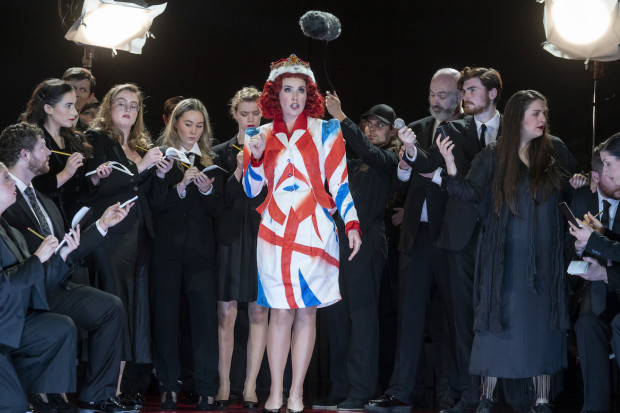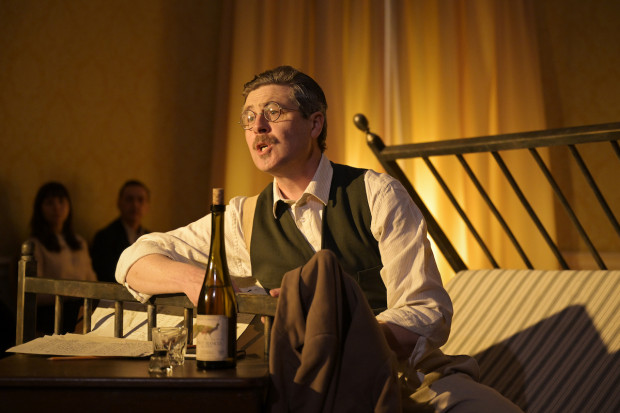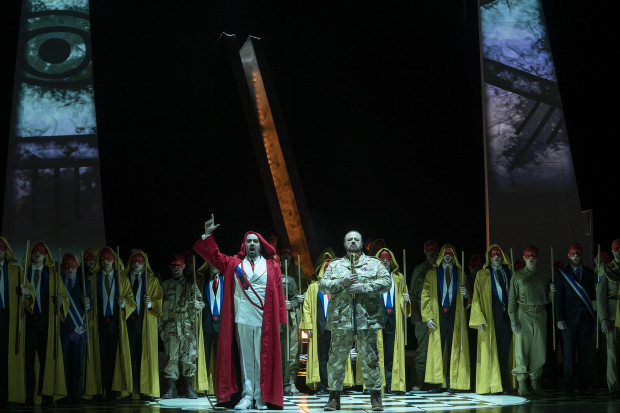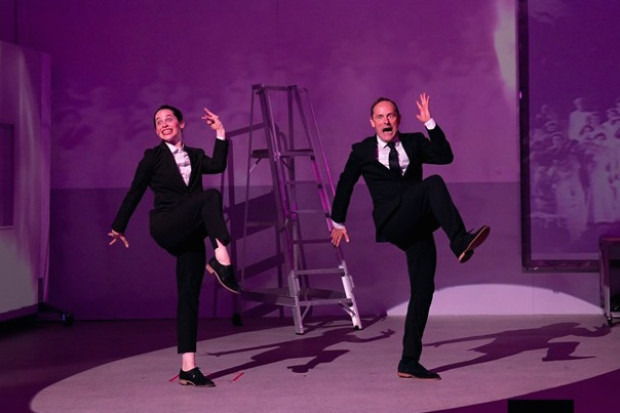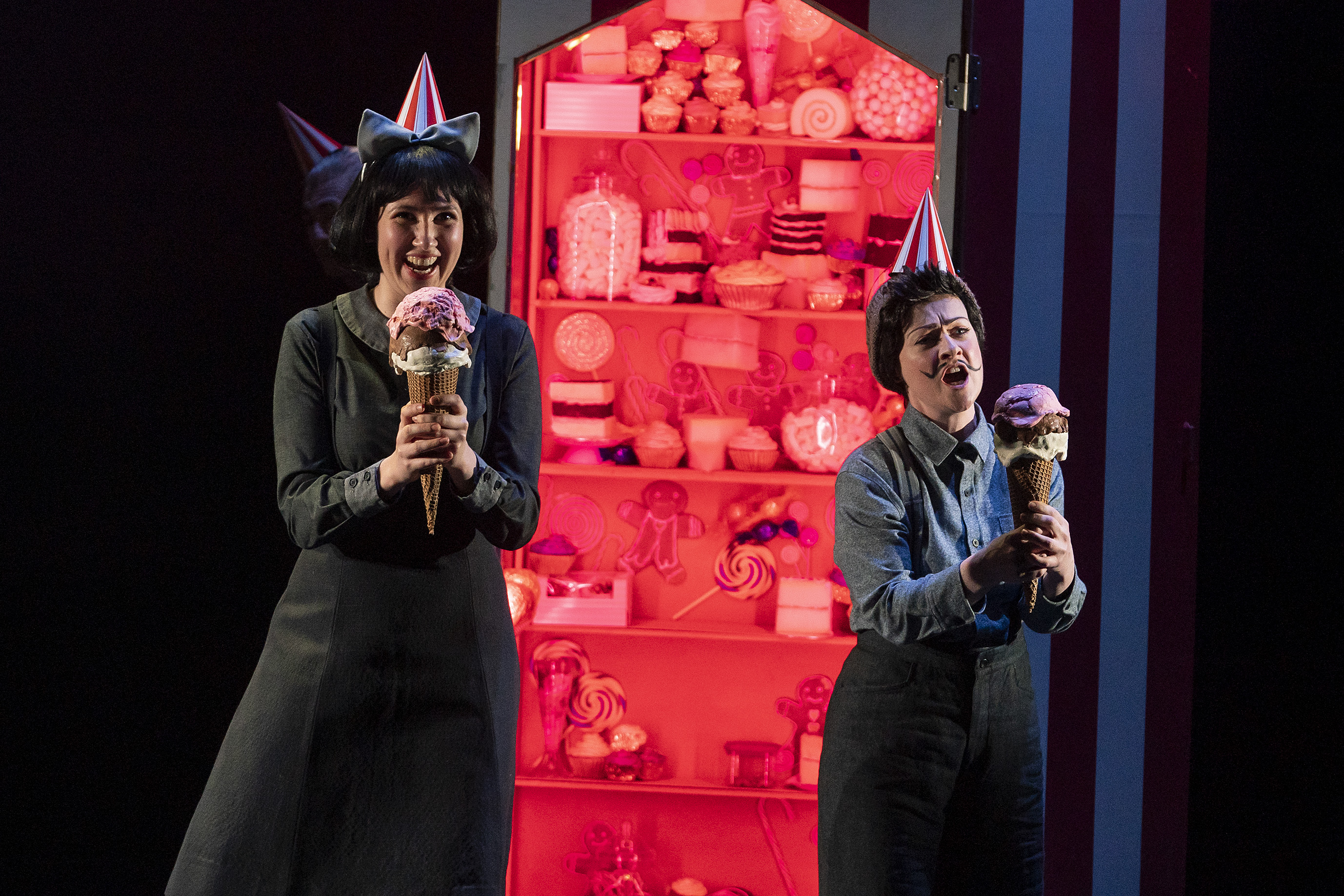
Amy Ní Fhearraigh and Raphaela Mangan in Irish National Opera’s Hansel and Gretel (Photo: Pat Redmond)
Sweet Siblings
Classic fairy tales have long been a favourite of composers. They straddle the lines between light and dark, humour and despair, hope and tragedy. Composers revel in pushing the boundaries for these works, creating music that is lush and full of magic just like the fairy tales themselves. Yet, productions of these operatic fairy tales can be a struggle for the creative teams, not wanting the production to be predictable whilst still capturing the essence of the tale. Theatre Lovett, Abbey Theatre and Irish National Opera, however, created a fresh take on Humperdinck’s Hansel and Gretel in the Town Hall Theatre in Galway (3 March) as part of their national tour of the production. This was Louis Lovett and Muireann Ahern’s first time directing an opera. Despite having had theatre success with They Call Her Vivaldi and The Girl Who Forgot To Sing Badly, they said in the programme that they were frightened by this opportunity. This fearfulness did not end up on stage though.
This interpretation of the work, sung in English, is set in the Forest Edge Hotel, lit up in flashing neon lights. Setting the opera in a hotel rather than the traditional forest is a nod to both the excitement and danger that children can experience in these everyday buildings. The orchestra, made up of Sarah Sew and Bogdan Sofei on violin, Andreea Banciu on viola, Ríona Ó Duinnín on flute/piccolo, Conor Sheil on clarinet/bass clarinet, Liam Duffy on horn, and Richard Peirson playing piano and conducting, sit to one side of the stage and act as the hotel’s house band. Pierson’s arrangement of the opera for this small ensemble is a wonderful feat. The score is full and rich, and works for the small set and cast. As the guests begin to check in to the hotel, they are greeted by the Night Watchman played by Raymond Keane. The role is a silent one but acts as a thread weaving the story together in a way that we are never quite sure of his motives. As a guest checks in with her children during the overture, he draws them away from her with lollipops and into the hotel lift, disappearing with the mysterious woman on the balcony.
In Act I, Hansel and Gretel, played by Raphaela Mangan and Amy Ní Fhearraigh, along with their parents, Miriam Murphy and Ben McAteer, enter the foyer looking for a room. The scene is reminiscent of hotels all over the country providing shelter to families in need of housing. Mother is tired and angry, wanting a few minutes peace away from her children, and so sends them off to search the hotel for food. The production takes some small liberties with the translation, making it more modern and local, as when Father arrives home with a takeaway bag; Mother divides up the chicken nuggets, battered sausages and chips.
Haunting duet
In the Haunted Woods Bar, the Night Watchman doubles as the bartender and the lounge singer is the Dew Fairy, whose children were lost in overture. She drinks gloomily in the corner. Here we see some truly beautiful vocal performances from Mangan, Ní Fhearraigh and Emma Nash as the Dew Fairy. The piece ‘Cuckoo, Cuckoo’ is performed with such fluidity that the demanding piece appears easy. Their voices are pure and blend with a comfort heard more in choristers than in opera singers. As Act II draws to a close, the title characters sing what is one of the best-known pieces, ‘Evening Prayer’, as Hansel and Gretel are lost in the hotel and must sleep in the Haunted Woods Bar with the help of the Sandman, also played by Nash. The ‘Evening Prayer’ is sung with the discipline needed to perform this haunting duet, yet still carries emotion through every phrase.
Hansel and Gretel find themselves in the Wickedly Rich Kitchen, shocked that they slept so well in such a strange place, and, drawn by the hunger long festering within them, begin to raid the kitchen’s stores. The childlike reactions to ice cream and cake that Mangan and Ní Fhearraigh employ in these scenes match perfectly to their characters. The Witch played by Carolyn Dobbin is wonderfully sinister and manic as she sings ‘Greedy little mousy, who’s nibbling at my housey?’. The Witch freezes Gretel and locks Hansel in a cage. With the help of the Night Watchman and Hansel, Gretel casts the Witch into the oven heated for the children, killing her and freeing themselves from her claws. This act also frees the children seen in Act I, played by Ronan Millar and Amelie Metcalfe, though they are blind. Hansel and Gretel use the Witch’s magic to bring back the sight of these children and all are reunited with their parents in the triumphant finale ‘Father! Mother!’.
All the roles were well sung, but the stand-out members of the cast have to be Mangan, Ní Fhearraigh and Keane. There is always a danger when adults play children that the roles look satirical and bordering on pantomime, but here both Mangan and Ní Fhearraigh never stray towards this. Subtle changes in posture and facial expressions made the audience go along with the idea that they are children. The pair are also well matched vocally. Ní Fhearraigh’s voice is bright and agile, while Mangan’s has a rich and expressive colour. They complement each other in their duets yet bounce off one another just like real siblings. Keane’s Night Watchman is the role that binds the opera together. He is there in almost every scene, moving, highlighting and rearranging depending on what the central singer of the scene needs. His comic timing and movement throughout is captivating to watch and was a clever addition to a thoroughly enjoyable opera.
For more on Irish National Opera, visit www.irishnationalopera.ie.
Published on 13 March 2020
Tara Broderick is a teacher and graduate of CIT Cork School of Music. She was a participant in the Journal Music's 2019 Galway City and County Music Writer Mentoring Scheme.












